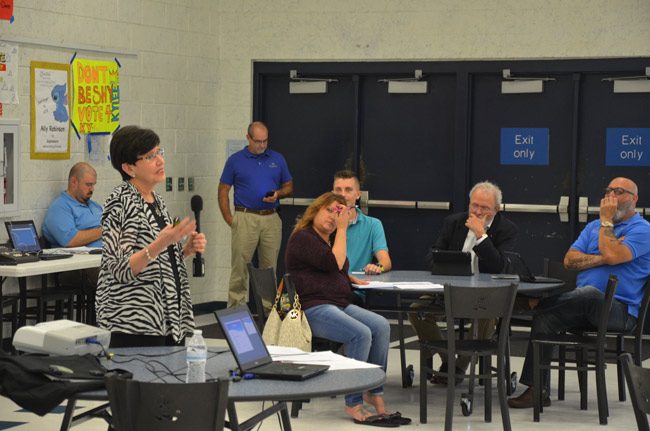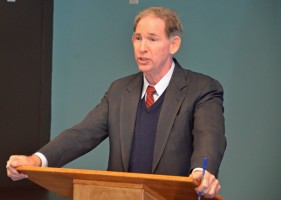
Palm Coast’s charter-review process to date has amounted to a whimper rather than a bang. The Palm Coast City Council’s three hour workshop on the subject on Tuesday tried to distill months of workshops and behind-the-scenes toil into a set of proposed charter review amendments for the November 2018 ballot.
The workshop echoed earlier whimpers: a few rather cosmetic proposals aside, there were no surprises, no big ideas to change the way the city runs, and certainly nothing like the six, 10 or more referendum proposals City Attorney Bill Rieschmann initially talked of as if he was referring to a disease about to trigger “ballot fatigue” for tens of thousands of voters. From the sounds of it, there may be three or four proposals on the ballot, if that.
It’s all a reflection of an undercurrent the council itself brought to the process from the start, when a majority of council members felt the charter is not broke, so why fix it. The charter-review process, such as it was, was a concession to one of their members, Steve Nobile, but a guarded one that at all points was kept firmly within the control of the city administration and the majority’s will to not stray much further than cosmetic changes. That, in fact, is what took shape over the month, down to Tuesday’s more concrete proposals. The one possible exception is a proposal to expand the council from five to seven members, but that proposal’s prospects are shaky.
That’s assuming that Tuesday’s meeting was as substantial as the administration tried to make it. That’s not clear, because it’s not yet clear whether the proposals the council discussed for three hours are its own, or those of the administration. Near the end of the meeting, Council member Nick Klufas made that explicit, when speaking about one of the proposals.
“I feel like this is a weird disconnect,” Klufas said, “I’m kind of struggling as to whether or not we’re going to see action on these items. Is it a recommendation? Is it just something we’re talking about now?”
Mayor Milissa Holland suggested that there’d be a further discussion between council members regarding more concrete ballot initiatives, if any. Because the only thing they all agreed on so far is to “clean up” the existing charter of pedestrian wording and pages that are outdated and have nothing to do with the running of the city.
When the Palm Coast City Council opted to review its charter—what amounts to the city’s constitution—it directed its administration, through a facilitator, to hold four public workshops in different parts of the city that each explained a different part of the charter and solicited public input on desired changes.
The workshops drew at most a dozen to 15 people each, many of those people the same ones attending each workshop. Significant parts of the sessions devolved into debates between City Attorney Bill Reischmann and audience members who thought the process was not a charter review—a contention Reischmann eventually conceded the point, saying the workshops were not part of a review but an explanation of the charter that gave the public a chance to speak its mind regarding potential changes. The city had in fact clumsily projected the process as a review, but Reischmann’s point was accurate: the council had never seen the workshops as the review process itself.
But the council had decided that what review would take place would be exclusively its purview, and that did contradict at least parts of the charter, which called on the city to hold a review after 10 years, something the city did not do, and possibly every 10 years after that, though that’s not an explicit requirement. The review process is also clearly outlined, calling for the council to appoint an independent commission that would go through the exercise and propose ballot measures. The council instead opted to be the reviewing panel.
On Tuesday, Marylin Crotty, the facilitator the city hired for the four workshops, and Reischmann, along with City Manager Jim Landon—who’s been intimately involved in the process—submitted the sum total of the four workshops’ results, including Crotty’s analysis and residents’ suggestions. The three-hour workshop with the council was an attempt to digest the materials into a set of proposed charter amendments the council wants to see on the November 2018 ballot.
It was Landon who spoke to the point the public contested most during the workshops: “We’re recommending that every 10 years charter review would occur,” Landon said, “must appoint an advisory committee to do that, and then once again language in there that you can amend the charter periodically, city council can put it on the ballot periodically without the charter review committee, but there needs to be a charter review committee appoint ted at least once every 10 years.”
But there was no doubt about Landon’s contempt for such a committee, a contempt he made clear toward the end of the meeting when he addressed the matter again: “The charter-review committee has been causing problems for at least two years, so let’s get that out of our hair,” he said.
The council could have taken that every approach last year when it chose to undergo a charter review. It’s not clear why Landon did not recommend that at the time: he encouraged the council to keep the process in its hands, which it could legally do by statute.
The proposal to require a commission-led review every 10 years is one of the few proposed ballot measures that came out of the three-hour workshop. Others were to clarify the process of succession when the mayor’s or a council member’s term is not completed, and when a special election would be required. A third proposal would be to expand the council from five seats to seven, with the two additional seats going to members who would represent the city at large, as opposed to representing specific districts. But all council members would still be elected by all residents regardless of districts.

He raised the issue of the cost of adding pages to the ballot, which Palm Coast would have to pay. But during the meeting Elections Supervisor Kaiti Lenhart emailed the city clerk figures outlining what costs she would imagine would be incurred by a longer ballot: Just shy of $11,000, counting both an extra page on the ballot and the extra mail cost for mailed ballots.
Holland seemed less concerned by “ballot fatigue.”
“I also think it’s important though once we get through this process and we determine that we do want these ballot measure,” the mayor said, “that we as a governing body educate our residents and say this is why we’re recommending looking at this and this is what it does to your charter. I don’t think it ends there. I think we need to do some work following work to ensure that our residents get the full picture.”
There were long digressions about the mechanics of a referendum, of referendum language, on whether to replace the mayor or council members by special elections and when, and on the expansion of the council from five to seven members, an issue that drew the clearest responses from members.
Nobile alone was pushing the seven-member approach. (Council member Heidi Shipley was absent.)
“You don’t feel that that might be too many chefs in the kitchen?” Klufas asked him, clearly testing Nobile’s ire.
“You know what, in this scenario chefs are important, because we’re representing people, the more diverse thought, I think the better,” Nobile replied.
“I don’t want to increase the size of local government, that’s where I stand,” Klufas said. Councilman Robert Cuff termed himself “not adamantly opposed,” but it was far from an endorsement. Holland did not state a position.
There was a long discussion about council members’ authority to direct administrative issues, and the limits of that authority, but it did not result in a ballot proposal they could agree on, nor did the discussion on the manager having a second in command who’d be in charge in his absence. Landon, however, jumped on that discussion as an opening to carefully reveal that he would soon be appointing a deputy manager. He did not say who, but the front runner would likely be Beau Falgout, his economic development director, who he’d told council members in summer he saw as his successor as manager in Palm Coast. By giving him the title of deputy, he’d be increasing his chances of landing a job as a manager elsewhere.
“I have a whole different philosophy, it’s not a very common philosophy, but it’s my management style,” Landon said. “When I leave town and I know I’m leaving town I don’t designate somebody as a boss. All the directors are the boss. I don’t need the fire chief telling the public works director what to do when I’m gone, it doesn’t make any sense. They all know what they’re supposed to be doing. And in today’s world, I am a phone call, an email away.” Then he added: “We probably are at that stage where I need to have an assistant city manager. I’ve been thinking about that and this conversation is actually headed in that direction, so there is somebody there I know in charge if I’m not here, but that assistant city manager won’t have supervisory authority over directors.”
He said he would not create a new position so much as designate someone.
Then he provided a bookend to the three-hour discussion, this time speaking—as he now routinely does, without objections from council members—more as a policy-making council member than a manager: “Fact of it is our charter is really not broken. It needs to be cleaned up.”
“There are certain things that you can do that we know there’s unintended consequences and we’re going to let you know those if you start heading in that direction. Our experience collectively, working with a lot of different cities, will tell you yeah, that may sound good, but boy, this is kind of what we’ve seen happen. But we haven;t been hearing that today. There wasn’t a bad direction from my point of view that I’ve heard today whatsoever. It’s been very good. Long and,” he paused, “boring, but…” his voice trailed in laughter.
A charter review process, of course, is not intended to please a city manager or a city administration, but to reflect the will of policy makers and, primarily, of residents. Those voices were not as much in evidence through the long workshops, just as they had not been in evidence at the workshops preceding Tuesday’s exercise.





























Anonymous says
If the council members and mayor got their heads out of their behinds and were competent they would be able to get all the measures on the ballot and clean it up. They look like they aren’t supposed to do any work. There is no excuse for this kind of representation. All need to be replaced! Bring on the election.
tulip says
Mr Nobile mentioned having a 7 person council. I think that is a good idea because it would be harder for council people to form their own little “cliques” and, if a council person is absent on a vote,
it doesn’t narrow the vote down to just a few people.
I also think that the more heads at the table the better, because each person has their own thoughts and knowledge (hopefully) to contribute to an issue and a better decision might be made, through thoughtful and open minded discussions.
Like the County commissioners, the City council has too much cronyism and not enough backbone.
BlueJammer says
Looks like a very exciting meeting! Then again, I wonder if the two men in the background are playing Candy Crush on their IPhones.
George Meegan says
Waste of time as it is not legal for the inmates to run the asylum!